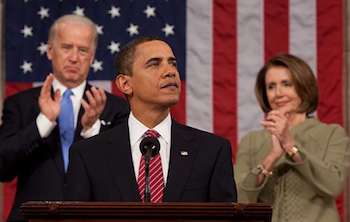- MENU
- HOME
- SEARCH
- WORLD
- MAIN
- AFRICA
- ASIA
- BALKANS
- EUROPE
- LATIN AMERICA
- MIDDLE EAST
- United Kingdom
- United States
- Argentina
- Australia
- Austria
- Benelux
- Brazil
- Canada
- China
- France
- Germany
- Greece
- Hungary
- India
- Indonesia
- Ireland
- Israel
- Italy
- Japan
- Korea
- Mexico
- New Zealand
- Pakistan
- Philippines
- Poland
- Russia
- South Africa
- Spain
- Taiwan
- Turkey
- USA
- BUSINESS
- WEALTH
- STOCKS
- TECH
- HEALTH
- LIFESTYLE
- ENTERTAINMENT
- SPORTS
- RSS
- iHaveNet.com: Politics
by Kenneth T. Walsh

President Obama
Within 24 hours Obama was on the road pushing his proposals
President Obama's State of the Union address wasn't just a rhetorical exercise to describe his agenda for 2010. It was also the kickoff of a full-fledged campaign to stake out the high ground in his fight with congressional Republicans and prove to stressed-out Americans that he will make job creation his top priority.
Obama admitted that he has endured "some political setbacks this year, and some of them were deserved." But he added: "I wake up every day knowing that they are nothing compared to the setbacks that families all across this country have faced this year. And what keeps me going, what keeps me fighting, is that despite all these setbacks, that spirit of determination and optimism, that fundamental decency that has always been at the core of the American people, lives on."
Within 24 hours of his State of the Union address, Obama was on the road for the start of a barnstorming tour taking his message across the country. His first event was in sharp contrast to the formal ritual of the State of the Union -- a shirt-sleeve appearance at a town-hall meeting with Vice President Joe Biden in Tampa. "The worst of the storm of storms has passed," Obama said in Florida, "but 1 in 10 Americans can't find work. That is why creating jobs has to be our No. 1 priority in 2010." Taking a somewhat more combative approach than he took in the State of the Union, Obama added: "Change never comes without a fight. I won't stop fighting, and I know you won't, either." Next on his itinerary was a speech in Baltimore about his job-creation proposals.
But no matter how feisty or eloquent the president is, the success of
his administration will depend on how effective he is in delivering
results. "We've had the rhetoric and the show," says Ken
Duberstein, former
Healthcare, in fact, had been Obama's top domestic priority since he
took office a year ago, but the legislation has stalled in
Still, Obama pledged not to give up on healthcare reform. He didn't
clarify what an eventual compromise might look like and accepted a share
of the blame for not adequately explaining to the public what an
overhaul would do. But he said many Americans need a healthcare reform
bill to gain adequate coverage, to eliminate abusive practices by
insurance companies, and to hold down costs. "I will not walk away from
these Americans, and neither should the people in this chamber," he told
assembled lawmakers at the joint session of
While his latest agenda was filled with familiar initiatives, there were some new ones. Obama called for a series of tax incentives for small businesses; slashing tax breaks for companies that shift jobs overseas; providing tax breaks for firms that create jobs in the United States; freezing most discretionary domestic spending for three years; and building "safe, clean nuclear power plants" as part of his energy strategy to reduce reliance on foreign oil.
He also said he would issue an executive order creating a bipartisan
commission to recommend ways of reducing the deficit. The
Overall, it's clear that he faces a rocky road. Democrats are divided
on key parts of his agenda, such as healthcare and his proposal for the
domestic spending freeze. And Republicans are united against him. In the
official
Congressional Republicans launched an attack on Obama for supposedly
giving short shrift to the war on terrorism.
For their part, Democratic operatives were eager to return fire. "The Republicans are standing with special interests to block healthcare and standing in the way of regulatory reform," says a Democratic strategist. "We need to draw clear lines to sharpen the distinctions about what they stand for and what we stand for." The continued sniping showed how far away bipartisanship truly is.
Available at Amazon.com:
The Political Fix: Changing the Game of American Democracy, from the Grassroots to the White House
AMERICAN POLITICS
WORLD | AFRICA | ASIA | EUROPE | LATIN AMERICA | MIDDLE EAST | UNITED STATES | ECONOMICS | EDUCATION | ENVIRONMENT | FOREIGN POLICY | POLITICS
Receive our political analysis by email by subscribing here
Obama's Post State of the Union Campaign | Kenneth T. Walsh
© Tribune Media Services